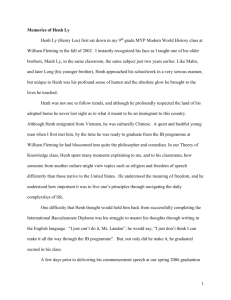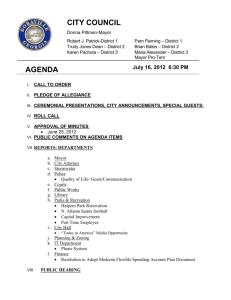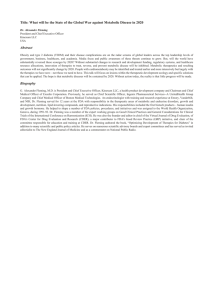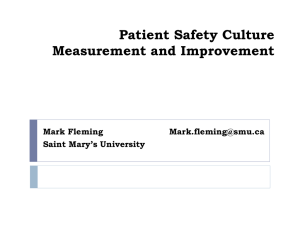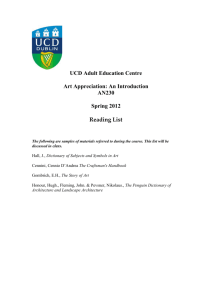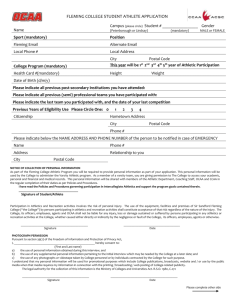From the court
advertisement
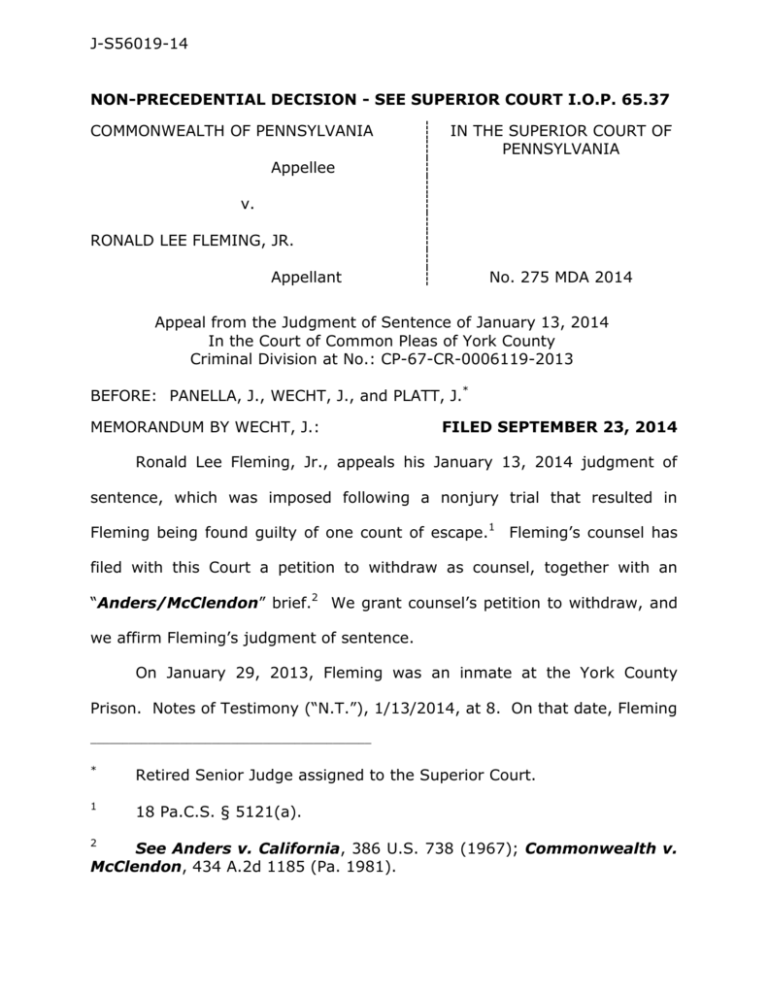
J-S56019-14 NON-PRECEDENTIAL DECISION - SEE SUPERIOR COURT I.O.P. 65.37 COMMONWEALTH OF PENNSYLVANIA IN THE SUPERIOR COURT OF PENNSYLVANIA Appellee v. RONALD LEE FLEMING, JR. Appellant No. 275 MDA 2014 Appeal from the Judgment of Sentence of January 13, 2014 In the Court of Common Pleas of York County Criminal Division at No.: CP-67-CR-0006119-2013 BEFORE: PANELLA, J., WECHT, J., and PLATT, J.* MEMORANDUM BY WECHT, J.: FILED SEPTEMBER 23, 2014 Ronald Lee Fleming, Jr., appeals his January 13, 2014 judgment of sentence, which was imposed following a nonjury trial that resulted in Fleming being found guilty of one count of escape.1 Fleming’s counsel has filed with this Court a petition to withdraw as counsel, together with an “Anders/McClendon” brief.2 We grant counsel’s petition to withdraw, and we affirm Fleming’s judgment of sentence. On January 29, 2013, Fleming was an inmate at the York County Prison. Notes of Testimony (“N.T.”), 1/13/2014, at 8. On that date, Fleming ____________________________________________ * Retired Senior Judge assigned to the Superior Court. 1 18 Pa.C.S. § 5121(a). 2 See Anders v. California, 386 U.S. 738 (1967); Commonwealth v. McClendon, 434 A.2d 1185 (Pa. 1981). J-S56019-14 was participating in a work release program under the supervision of Robert Shoop, a work crew supervisor. The inmates were installing insulation into the roof of a house located in the City of York. At approximately 11:50 a.m., Fleming asked Mr. Shoop for permission to use the restroom facility, which was a porta-potty located behind the house. Id. at 8-9. When the crew broke for lunch at approximately 12:00 p.m., Mr. Shoop noticed that Fleming had not returned from the porta-potty. Id. at 9. Mr. Shoop checked the porta-potty, the house, and the area around the house, but was unable to locate Fleming anywhere in the vicinity. permission to leave the worksite. Fleming did not have After searching for Fleming for several minutes, Mr. Shoop gathered the other inmates and prepared to return to the prison. Id. at 10. Mr. Shoop then called the prison and the Pennsylvania State Police. Fleming did not return to the worksite or to the York County Prison. At trial, Mr. Shoop identified Fleming as the individual who left the worksite on January 29, 2013. Id. at 9. Benjamin Harry testified that, in his employment capacity as a work release counselor for the York County Prison, he goes over the work release rules with inmates that apply to the program. Id. at 17. Mr. Harry stated that the rules include a requirement that “[the inmates] cannot escape or walk off.” Id. at 18. Fleming applied to the community cleanup program, and Mr. Harry reviewed the applicable rules with Fleming. Both Fleming and Mr. Harry signed a form that indicated that Fleming understood those rules. -2- J-S56019-14 Id. at 19. Mr. Harry testified that, according to the rules, “any inmate that walks off will be charged with escape.” Id. at 22. After receiving the report about Fleming’s absence from the worksite, York County Prison officials called local hospitals, contacted “central booking,” and attempted to reach family members, but were unable to locate Fleming. Id. at 25-26. The prison officials contacted the Pennsylvania State Police, and a warrant was issued for Fleming’s arrest. Id. at 33-34. Fleming did not return to the prison for several months after he removed himself from the worksite. Id. at 34. Fleming later was arrested upon the execution of an arrest warrant. Throughout the trial, Fleming focused his arguments upon the York County Prison’s internal disciplinary rules and procedures, apparently under the impression that the prison’s failure to observe its own policies with regard to an escape would preclude the Commonwealth’s prosecution of that offense. Id. at 30-31. The thrust of Fleming’s argument is reflected in the following statement: “The prison has no authority to charge me without following the procedures first.” Id. at 31. As the trial court reminded him, however, Fleming was charged by the Commonwealth with a violation of the Crimes Code, not charged by the prison with a violation of the prison rules. Id. at 30-31. At the conclusion of the trial, the court found Fleming guilty of escape. Fleming proceeded directly to sentencing, and was sentenced to one to two years’ incarceration in a state correctional institution, to be served -3- J-S56019-14 consecutively to any sentence that he had not yet completed. Although Fleming represented himself at trial with Attorney Ronald W. Jackson, Jr., serving as standby counsel, he requested that Attorney Jackson be appointed to represent him in the preparation and filing of an appeal. Fleming filed a notice of appeal on February 10, 2014. On February 11, 2014, the trial court directed Fleming to file a concise statement of errors complained of on appeal pursuant to Pa.R.A.P. 1925(b), to be served on the court no later than March 4, 2014. On March 3, 2014, Fleming filed a motion for extension of time to file a concise statement. On March 5, 2014, the court granted Fleming’s motion, and extended the time to file a concise statement to April 7, 2014. On April 4, 2014, Fleming’s counsel filed a statement of intent to file an Anders/McClendon brief in lieu of a concise statement pursuant to Pa.R.A.P. 1925(c)(4). In accordance with Pa.R.A.P. 1925(a), the trial court issued an opinion in support of its order on April 21, 2014. Before addressing the merits of the underlying issue that Fleming presents for our review, we first must pass upon counsel’s petition to withdraw. Commonwealth v. Goodwin, 928 A.2d 287, 290 (Pa. Super. 2007) (en banc). Prior to withdrawing as counsel on a direct appeal under Anders, counsel must file a brief that meets the requirements established by our Supreme Court in Commonwealth v. Santiago, 978 A.2d 349, 361 (Pa. 2009). The brief must: -4- J-S56019-14 (1) provide a summary of the procedural history and facts, with citations to the record; (2) refer to anything in the record that counsel believes arguably supports the appeal; (3) set forth counsel’s conclusion that the appeal is frivolous; and (4) state counsel’s reasons for concluding that the appeal is frivolous. Counsel should articulate the relevant facts of record, controlling case law, and/or statutes on point that have led to the conclusion that the appeal is frivolous. Santiago, 978 A.2d at 361. Anders brief to the appellant. Counsel also must provide a copy of the Attending the brief must be a letter that advises the appellant of his or her right to “(1) retain new counsel to pursue the appeal; (2) proceed pro se on appeal; or (3) raise any points that the appellant deems worthy of the court’s attention in addition to the points raised by counsel in the Anders brief.” Commonwealth v. Nischan, 928 A.2d 349, 353 (Pa. Super. 2007); see Commonwealth v. Daniels, 999 A.2d 590, 594 (Pa. Super. 2010); Commonwealth v. Millisock, 873 A.2d 748, 751 (Pa. Super. 2005). Our review of counsel’s petition to withdraw and the accompanying brief reveals that counsel substantially has complied with the Santiago requirements. Counsel has provided a factual and procedural history detailing the events relevant to the instant appeal in his brief, along with appropriate citations. Brief for Fleming at 5-8. Fleming identified one claim to counsel that he wanted to raise on appeal: a challenge to the sufficiency of the evidence to convict him beyond a reasonable doubt of escape. Id. at -5- J-S56019-14 10. Counsel addresses the applicable facts and principles of law, ultimately concluding that this claim would be frivolous. Id. at 10-12. In his petition to withdraw as counsel filed with this Court, counsel again certified that he has “determined, upon a conscientious examination of the entire record, including all notes of testimony, that a direct appeal would be frivolous.” See Petition to Withdraw as Counsel, 6/4/2014, ¶3. Although counsel has not referred to any information in the record that counsel believes arguably would support Fleming’s pursuit of relief, we acknowledge that the absence of such a reference reflects the fact that counsel believes that there is no information in the record that supports Fleming’s sufficiency claim. Additionally, in accordance with Nischan, counsel has sent Fleming a copy of the Anders/Santiago brief and a letter informing him that: (1) he has the right to hire an attorney to file an advocate’s brief on his behalf; (2) he may file additional statements raising points that he deems worthy of the Superior Court’s consideration; and (3) he may proceed further with his case pro se or by hiring a private attorney. Letter, 6/4/2014. Accordingly, we conclude that counsel substantially has complied with the requirements set forth in Nischan, 928 A.2d at 353. See also Millisock, 873 A.2d at 751. We now must conduct an independent review of the record to determine whether the issues identified by Fleming in this appeal are, as counsel claims, wholly frivolous, or if there are any other meritorious issues present in this case. Santiago, 978 A.2d at 354 (quoting Anders, 386 U.S. at 744) (“[T]he court – not counsel – then proceeds, after a full examination -6- J-S56019-14 of all the proceedings, to decide whether the case is wholly frivolous. If it so finds, it may grant counsel’s request to withdraw . . .”). We begin with Fleming’s challenge to the sufficiency of the evidence. When reviewing challenges to the sufficiency of the evidence, our standard of review is as follows: The standard we apply in reviewing the sufficiency of the evidence is whether viewing all the evidence admitted at trial in the light most favorable to the verdict winner, there is sufficient evidence to enable the fact-finder to find every element of the crime beyond a reasonable doubt. In applying [the above] test, we may not weigh the evidence and substitute our judgment for the fact-finder. In addition, we note that the facts and circumstances established by the Commonwealth need not preclude every possibility of innocence. Any doubts regarding a defendant’s guilt may be resolved by the fact-finder unless the evidence is so weak and inconclusive that as a matter of law no probability of fact may be drawn from the combined circumstances. The Commonwealth may sustain its burden of proving every element of the crime beyond a reasonable doubt by means of wholly circumstantial evidence. Moreover, in applying the above test, the entire record must be evaluated and all evidence actually received must be considered. Finally, the [finder] of fact while passing upon the credibility of witnesses and the weight of the evidence produced, is free to believe all, part or none of the evidence. Commonwealth v. Phillips, 93 A.3d 847, 856 (Pa. Super. 2014) (citations omitted). Further, in viewing the evidence in the light most favorable to the Commonwealth as the verdict winner, the court must give the prosecution the benefit of all reasonable inferences to be drawn from the evidence. Commonwealth v. Widmer, 744 A.2d 745, 751 (Pa. 2000). -7- J-S56019-14 Fleming was convicted of one count of escape. The crime of escape is defined as follows: A person commits an offense if he unlawfully removes himself from official detention or fails to return to official detention following temporary leave granted for a specific purpose or limited period. 18 Pa.C.S. § 5121(a) (emphasis added). The testimony produced at trial demonstrated that Fleming’s actions satisfied the material elements of escape. “Official detention” is defined in the statute as “detention in any facility for custody of persons under charge or conviction of a crime.” 18 Pa.C.S. § 5121(e). Fleming, as an inmate at the York County Prison, clearly was in official detention at the time of the offense. As a result of his participation in the prison’s work release program, Fleming was granted temporary leave from his detention for the specific purpose of serving on a work crew. The leave that was granted to Fleming was for a limited period, as he was obligated to return to the prison with the other inmates in the program when their shift was completed. Fleming’s supervisor gave him permission to use the restroom, but not to leave the worksite. Fleming did not return from the restroom, and could not be located thereafter. Because the testimony demonstrated that Fleming did not return to the worksite or to the prison, he failed to return to “official detention” following the temporary leave that was granted to him. “Evidence will be deemed sufficient to support the verdict when it establishes each material -8- J-S56019-14 element of the crime charged and the commission thereof by the accused, beyond a reasonable doubt.” Widmer, 744 A.2d at 751. The testimony produced at trial established each material element of the crime of escape, and, therefore, was sufficient to sustain Fleming’s conviction. Finally, we have conducted our own independent review of the record. We agree with counsel that the issue that Fleming seeks to litigate in this appeal is wholly frivolous. Additionally, we have discovered no other issues of arguable merit that would sustain an appeal in this case. Judgment of sentence affirmed. counsel granted. Judgment Entered. Joseph D. Seletyn, Esq. Prothonotary Date: 9/23/2014 -9- Counsel’s motion to withdraw as
